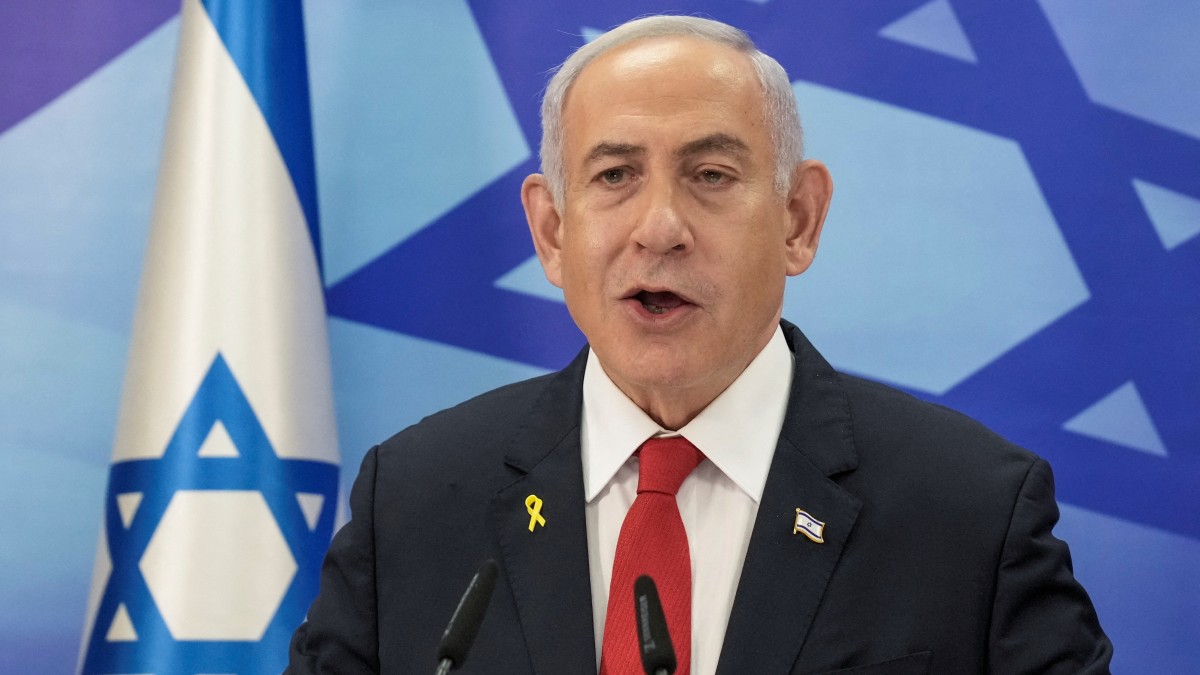Israeli Prime Minister Benjamin Netanyahu is set to take to the witness stand on Tuesday (December 10) for the first time in his long-running corruption trial.
He has been waging war in Gaza against the Palestinian militant group Hamas for more than a year, during which the 75-year-old leader was granted a delay for the start of his court appearances.
However, on Thursday, the judges ruled that he must start testifying.
Netanyahu has attempted to project an image of a sophisticated, well-respected leader, but his presence on the witness stand will be a low point in his decades-long political career, even though he denies any wrongdoing.
Here is what you need to know about the charges that have divided the Israeli public at a time of West Asian turmoil.
Netanyahu’s legal troubles
Netanyahu is on trial at home on three separate charges of fraud, breach of trust, and accepting bribes. He denies the charges and has pleaded not guilty.
Indicted in 2019, the trial began in 2020.
According to the prosecution, Netanyahu gave Bezeq Telecom Israel (BEZQ.TA) regulatory favours totalling around 1.8 billion shekels, or $500 million.
Prosecutors claim that in exchange, he asked for positive coverage for himself and his spouse, Sara, on a news website run by Shaul Elovitch, the company’s former chairman.
In the second case, the Israeli prime minister has been accused of fraud and breach of trust in connection with claims that he and his wife got gifts of about 700,000 shekels ($210,000) from Australian billionaire James Packer and Hollywood producer Arnon Milchan, who is an Israeli national.
According to the prosecution, Netanyahu assisted Milchan with his business ventures and received gifts like champagne and cigars. There are no charges against Milchan or Packer.
In the third matter, Netanyahu allegedly made a deal with Arnon Mozes, owner of Israel’s Yedioth Ahronoth daily, to improve coverage in exchange for legislation that would impede the expansion of a rival newspaper. Netanyahu has been charged with fraud and breach of trust.
Under Israeli law, a prime minister is not required to stand down unless convicted. They can remain in office for the duration of the appeals process if they file an appeal against their conviction.
Also read: The fall of Damascus: Iran loses its strategic depth, but Israel may still be walking cautiously
Could he be jailed?
Bribery charges are punishable by up to 10 years in prison and/or a fine. The maximum penalty for fraud and breach of trust is three years in prison.
The court decided that Netanyahu will testify three times a week, despite the Gaza war and potential additional dangers from the broader unrest in West Asia.
In these three cases, a verdict is unlikely to be delivered soon. The judges may not decide for many more months unless Netanyahu attempts to reach a plea agreement.
Also read: Israel, Turkey emerge as big winners from fall of Basher al-Assad's regime in Syria
Netanyahu denies wrongdoing
In the lead-up to his court date, Netanyahu repeated familiar pre-war rhetoric against law enforcement, describing investigations against him as a witch hunt.
He denies the charges and has pleaded not guilty.
“The real threat to democracy in Israel is not posed by the public’s elected representatives, but by some among the law enforcement authorities who refuse to accept the voters’ choice and are trying to carry out a coup with rabid political investigations that are unacceptable in any democracy,” he said in a statement on Thursday.
Before that, on Monday night press conference, the Israeli premier said he had waited eight years to be able to tell his story and expressed outrage at the way witnesses had been treated during investigations.
While fighting on the front lines has decreased in recent weeks following Israel’s ceasefire with Hezbollah, Hamas’ Lebanese partner, Netanyahu’s cabinet members, particularly his justice and police ministers, have clashed with the judiciary.
The 75-year-old, who has been in office almost consecutively since 2009, is Israel’s longest-serving leader and its first prime minister to face criminal charges.
His domestic legal woes were compounded last month when the International Criminal Court (ICC) issued an arrest warrant against him and his former Defence Chief Yoav Gallant, along with a Hamas leader, for alleged war crimes in the Gaza conflict.
Also read: Israel launches fresh airstrikes against Hezbollah in Lebanon, ceasefire hangs in balance
Impact on Israelis
Netanyahu’s trial was wiped from the agenda by the October 7, 2023, shock attack by Hamas on Israel and the subsequent war in Gaza, when Israelis united in grief and loss.
Before the conflict, the PM’s legal issues divided Israelis and shook the country’s politics through five election cycles. Israelis were further split by his government’s attempt last year to limit the judiciary’s authority.
After his decisive victory in 2022, his far-right government began a legal effort to limit the powers of the court, triggering mass protests and fears among Western allies for the country’s democratic stability.
Netanyahu maintained that his trial had nothing to do with the judicial overhaul. After the war started, he largely abandoned the plan, but in recent weeks, he has brought up some anti-judiciary rhetoric again.
With inputs from Reuters


)

)
)
)
)
)
)
)
)



